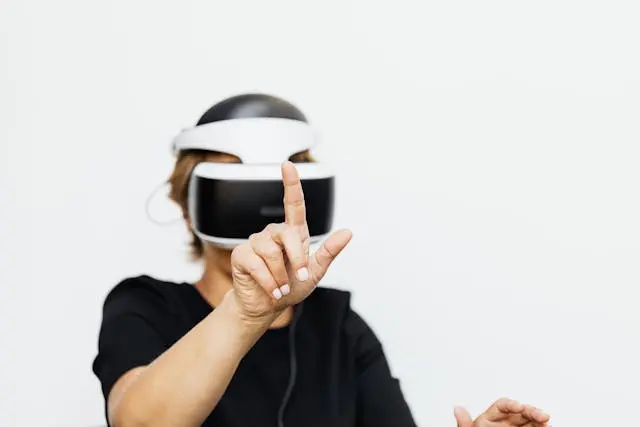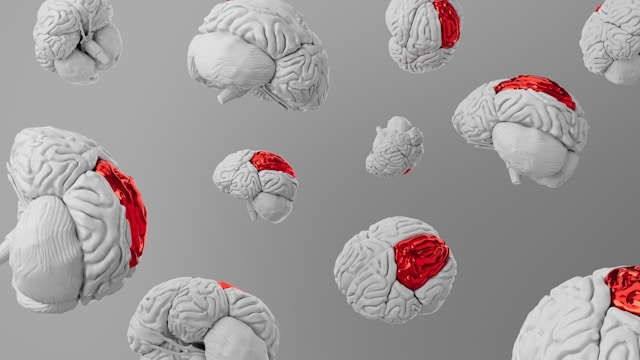In recent years, Virtual Reality (VR) has emerged as an innovative tool to enhance the quality of life for individuals with cognitive impairments, particularly those in memory care. As technology advances, new applications of VR are being explored in healthcare, offering immersive experiences that can improve mental and emotional well-being. For those living with Alzheimer’s disease, dementia, or other forms of cognitive decline, virtual reality offers a unique and promising way to stimulate the brain, reduce anxiety, and foster meaningful connections. In this blog post, we’ll explore the many benefits of using VR with the memory care population and how it can transform the way we support and engage individuals with memory impairments.
Stimulates Cognitive Function
One of the primary benefits of VR in memory care is its ability to stimulate cognitive function in a safe and controlled environment. Virtual reality experiences can be tailored to engage different parts of the brain, whether through memory recall, problem-solving, or attention to detail.
Revisiting familiar places: VR allows individuals to virtually visit places from their past, such as childhood homes or favorite vacation spots. This type of reminiscence therapy can help trigger memories and emotions that may otherwise be difficult to access.
Interactive experiences: Virtual environments can include cognitive challenges such as simple puzzles, mazes, or tasks that require focus and decision-making. These experiences help residents exercise their cognitive abilities in a way that’s engaging and enjoyable. Through stimulating environments and tailored activities, VR can help slow cognitive decline and enhance mental clarity.
Reduces Anxiety and Agitation
Anxiety and agitation are common symptoms in individuals with dementia or Alzheimer’s disease. VR has proven to be an effective tool for calming residents who may be feeling anxious or disoriented. By providing immersive experiences that can transport individuals to soothing environments, VR can act as a form of therapy to reduce stress.
Calming environments
Virtual experiences like a quiet beach, a forest, or a peaceful garden can create a sense of calm and relaxation. These environments offer an escape from the everyday stresses and confusion that many memory care residents face.
Guided meditation and relaxation techniques:
Some VR programs are designed to include guided breathing exercises or meditation in peaceful settings, helping individuals center themselves and reduce feelings of anxiety or restlessness. VR’s ability to immerse individuals in tranquil environments can provide immediate emotional relief, helping to reduce agitation without the need for medication.
Enhances Emotional Well-Being
VR can foster a sense of happiness and emotional well-being by offering residents the opportunity to engage in joyful, immersive experiences that they might not be able to participate in otherwise. For individuals whose physical limitations or memory loss make it difficult to explore the world in the traditional sense, VR provides an invaluable sense of freedom.
Virtual travel experiences:
Many memory care residents have lost the ability to travel, but VR allows them to “visit” new places, from famous landmarks to natural wonders. This opportunity can reignite a sense of adventure and curiosity, providing an emotional boost.
Nostalgia and reminiscence:
Virtual reality can take residents back in time by recreating environments that hold emotional significance for them, like childhood neighborhoods or iconic city streets from their past. The emotional connection to these places can enhance mood and give them a sense of belonging. By allowing residents to engage in meaningful and positive experiences, VR helps improve overall emotional health, contributing to a more content and fulfilling daily life.
Encourages Social Interaction
While VR is often thought of as a solitary activity, it can actually foster social interaction in memory care settings. Group sessions using VR can serve as a springboard for conversations and shared experiences, helping residents connect with each other and caregivers.
Group VR sessions:
In many memory care communities, VR is used as part of group activities, where residents explore virtual environments together. These shared experiences often lead to conversations about the places they’ve “visited” or memories that were triggered during the session.
Family engagement:
VR can also be a way to involve family members in meaningful ways. A family member can join a resident in exploring a virtual environment together, providing opportunities for shared experiences that might otherwise be difficult to achieve in traditional care settings. This social aspect of VR helps to reduce feelings of isolation that often accompany cognitive decline, promoting a greater sense of connection and belonging.
Physical and Sensory Engagement
For memory care residents, especially those with limited mobility, VR provides an opportunity for physical and sensory engagement. Even though the experience is virtual, the body responds to the sights, sounds, and movements presented in the VR environment, helping stimulate the senses.
Gentle physical engagement:
Some VR experiences encourage residents to move their heads, hands, or even get out of their seats to interact with the virtual world, promoting gentle physical activity.
Multi-sensory stimulation:
VR environments engage sight and sound simultaneously, offering residents a multi-sensory experience that may not be available in their day-to-day lives. This sensory stimulation can have positive effects on alertness and cognitive engagement. By offering sensory-rich experiences, VR helps engage the body and mind in a way that encourages physical movement and sensory awareness.
Improves Quality of Life
Ultimately, the goal of using VR in memory care is to improve the quality of life for residents. By offering a diverse range of activities that engage the mind, body, and emotions, VR can bring joy, comfort, and mental stimulation to those who may otherwise face limitations in their daily lives.
Increased engagement:
VR offers an alternative form of engagement for residents who may struggle to participate in traditional activities, keeping them mentally and emotionally active.
Empowerment:
By allowing residents to explore new places and revisit old ones, VR provides a sense of autonomy and empowerment, which can be particularly valuable for individuals who feel a loss of control due to their memory impairments. The enhanced sense of well-being and stimulation that VR provides can make a profound difference in how residents feel day to day, ultimately contributing to a more fulfilling and dignified experience in memory care.
Virtual Reality is proving to be a powerful tool for enhancing the lives of individuals in memory care. From stimulating cognitive function and reducing anxiety to fostering social interaction and improving emotional well-being, VR offers a wide range of benefits that can significantly improve the quality of life for those living with memory impairments. As technology continues to evolve, VR has the potential to become an even more integral part of memory care, providing innovative ways to engage and support individuals with dementia and Alzheimer’s disease.





